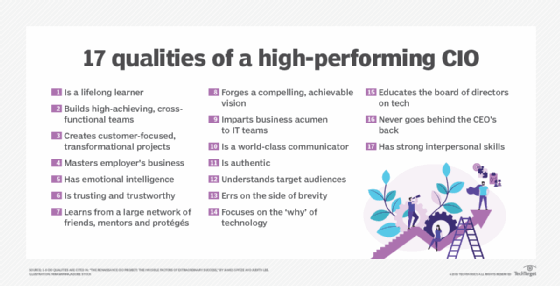Prepare for a CIO Interview With These 20 Questions
What are the intelligent questions to ask a CIO during an interview to ensure they're the right fit for the role? According to many IT leaders and recruiters, these are the top 20.
The CIO role has undergone a transformation over the past decade, moving from functional leader to senior executive who advises organizational strategy through their understanding of technology.
As the position evolved, so did its importance to organizational success. Today, every enterprise requires a CIO who can help the organization deliver on its unique value proposition. CEOs and other hiring executives look for potential candidates who can understand their unique organizational needs, their customers and their business partners. That's confirmed by CIOs themselves: According to the 2019 CIO survey from accounting and advisory firm Grant Thornton, CIOs must "focus on building trust in four areas: technology, customer, ecosystem and employee."
Given that, organizations seeking to fill the CIO role have stringent candidate requirements. These organizations should ensure they've come up with CIO interview questions that match the importance of the position, according to executive consultants and CIO recruiters.
CIO Role, Responsibilities and Key Skills
CIOs are responsible for overseeing the entire IT function, which includes delivering stable, reliable technology products and doing so in an effective, cost-efficient manner, according to executive advisors, management consultants and veteran CIOs. As C-suite executives, they also have senior roles responsible for staff recruitment, retention and development.
This article is part of
The evolving CIO role: From IT operator to business strategist
They typically serve as advisers to their C-suite colleagues and the heads of business lines, helping them understand how to utilize technologies to achieve objectives. CIOs also develop roadmaps for how emerging technology trends could both enable and impact their organizations in the future.

CIO Career Path
To deliver on the above, most CIOs are required to have a background in IT as well as some business education or experience, recruiters said.
Today, CIOs can still advance through the ranks of the enterprise IT department but they should also be able to demonstrate that they can speak the language of business, as well as how they utilized technology to enable the organization to achieve its strategic objectives. Recruiters noted that it's how many CIOs have advanced their careers from lower-level management positions to the C-suite -- by successfully leading high-visibility projects that delivered measurable business results.
Leadership Involved in the CIO Interview Process
With such high stakes, the full complement of enterprise leaders has become invested in the CIO hiring process. It's common for senior executives within an organization to meet and interview CIO candidates, said Paul Groce, a partner and head of Americas, leading CIO and CTO engagements at Leathwaite, a global human capital firm.
CEOs, COOs and chief human resource officers are most commonly involved in the CIO interview process, Groce said -- and occasionally members of the board of directors.
CIO Interview Questions
However, Groce and other recruiters stated that many executives continue to struggle finding the best interview questions to help them determine the candidate's skills and philosophies, as well as whether they'll fit in with the organization overall.
Preparing for a Video Interview
Interviewing for a job has changed thanks to the Covid-19 pandemic. Be prepared for a video conference interview with these tips.
Here, several experts shared the top 20 CIO interview questions organizations should ask and why.
1. What do you see as the CIO's top priority?
The answer will show if there's alignment between the candidate and the candidate profile developed by the organization, said Hillary Ross, senior partner, managing director and leader of the IT practice at the global executive search firm WittKieffer.
2. How have you helped move the business forward?
Groce advises CIOs to "be prepared to tell a story and go into detail about how you, as a leader of the technology, function throughout your professional history and have been able to support the business and make the business successful by leveraging technology, plain and simple."
3. What is your experience with digital transformation?
"Most people think about it being marketing and social media and big data, but that's the superficial definition. What you're looking at is whether the candidate understands what [digital transformation] means for the entire business, how it can affect all parts of the business," said Kathy Simmons, executive director of BlueSteps executive career services, a part of the Association of Executive Search Consultants (AESC).
4. Where do you see the industry heading in the next three to five years?
"It shows whether the candidate is a visionary, and it shows whether they're strategic," Ross said.
5. What's your strategic plan for your current IT organization for one year, three years and five years out?
Ryan Sutton, district president at IT staffing firm Robert Half Technology, said a strong CIO candidate should be able to articulate the short-term priorities as part of the one-year plan, demonstrate the ability to balance emerging trends with practical needs in the three-year plan and show some visionary elements with the five-year outlook.
6. How do you stay current on innovations and trends?
"It's important for most organizations to have leadership that has a network and is plugged into associations so they can not only stay current, but a little bit ahead," Ross said.
7. Can you tell me about a project you oversaw that was unsuccessful?
"You can learn a lot about how they're going to deal with other people. It gives you a sense of how they manage and how they view their work environment and whether they learn lessons from their past failures," Simmons said. "And if they start blaming others, it shows they're not taking any responsibility for their part."
8. How do you engage and get buy-in from your diverse groups of stakeholders?
CIOs who have been successful in the past should demonstrate in their response that they understand the key stakeholders and their needs, how to communicate with them and address their concerns, and ultimately how to gain their support for products, Simmons said.
9. How do you manage your workers?
"We now have four generations of people in the workplace," Simmons said, explaining that the generations span from boomers and Gen Xers through millennials and Gen Y. It's an unprecedented span that CIOs need to be equipped to handle.
10. How do you build your teams?
According to Simmons, a candidate's responses can reveal the traits they value most in their workers and whether they know how to create teams that have complementary skill sets. For example, a CIO who builds teams based on technical skills is different than one who picks workers based on their innovative or entrepreneurial spirit. Neither is better than the other but knowing what the candidate thinks and recognizing what the company needs from its teams can help ensure alignment.
11. How do you retain employees?
"It gets into the leadership culture and staff development," Sutton said, adding that CIOs -- like any executive -- should know their turnover rate and retention percentages. They should have a strategy for advancing their team and their workers' critical skills -- and they should be able to describe it in detail.
12. Can you walk me through your succession plan for your current role?
"A proper succession plan is really just a robust staff development plan," Sutton said. He noted that this question can put a spotlight on strong candidates who have considered their staff and their futures, as well as the organization's future.
13. Can you tell me about a time you lead a culturally diverse team?
This again illustrates whether a CIO can foster collaboration and cooperation among workers from different backgrounds, which could be critical at a company with an IT team that relies on offshore workers or has a global footprint, according to Simmons.
14. How do you support collaboration across departments?
"CIOs are needed to work in all areas, so you want to make sure the CIO can get out of the tech world and get buy-in and support from other areas to be effective in the role," Sutton explained.
15. Can you walk me through your current tech environment?
Sutton said many CEOs and other executives involved in interviewing CIO candidates shy away from asking this question because technology falls outside their areas of expertise -- and outside their comfort zone. But in asking a question like this, the hiring team can determine whether a candidate can effectively communicate technical concepts for a non-technical audience, which is an important attribute for any IT leader today.
16. How did you handle a recent conflict or challenge? How was it resolved?
"The reality is that it's not going to be all flowers and rainbows and sunshine," Sutton said. A CIO is going to have challenges." Hiring managers need to know that a candidate can successfully resolve disputes and how they do it, whether it's in a command-and-control manner or through compromise. It's important to figure out whether that style matches what the organization wants for its culture.
17. Why do you want this job?
"It's such as simple question but one that trips up candidates," Ross said. She has heard candidates respond in unimpressive ways, saying they simply want to move for better weather, or they want out of their current job. Those answers indicate a candidate who's not fully invested in the position or the new organization.
18. What are your longer-term goals and aspirations?
"These things all definitely flow together because the hiring team is looking to make sure the person's objectives are aligned with the organization's objectives," Groce said.
19. At which company were you most successful and why?
Learning from a candidate about the characteristics that made them most successful up until this point can help both the candidate as well as the hiring manager in determining whether the current opening would be a good match that also yields success, Groce said.
20. What energizes you in your current role and what depletes you?
"It can show if there's a good fit with the hiring organization," Ross said. "If you have someone who is energized by innovation and the organization is more focused on stabilization then that candidate isn't going to be happy. And if someone says they're depleted by mentoring and recruitment, that might be a problem for many organizations."








